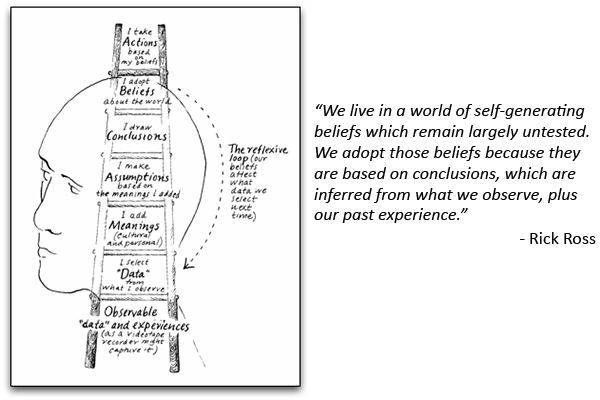Too frequently we behave as if our untested inferences or beliefs about what we observe and hear are “the truth.” What we infer from or believe about what we see and hear is often quite different from what we actually see and hear. In other words, we make up stories about our direct experience instead of paying attention to it.
Recently I was teaching mindfulness meditation to a group of “transition age youth.” As I spoke, one woman sat with her arms crossed, her legs extended in front of her. She looked at me with an expression that could have been interpreted in a number of ways: bored, impatient, angry, hostile, etc.
That’s the point: “could have been interpreted.” I noticed the stories spinning in my head. “Uh-oh. I might be in trouble. What is she thinking? ‘Who is this silly woman and what is she talking about?’” Fortunately, I noticed that I was rushing up the Ladder of Inference. It’s dangerous on top of any ladder including this one!
Developed by Harvard business theorist Chris Argyris, the Ladder of Inference helps us understand how quickly we go from our direct experience to our stories about it.
Here’s how we ascend the ladder. We have experiences in which we see or hear observable data (The meeting started at 9 AM). We select data from what we observe (Fido came in at 9:15). We add meanings based on our personal experience (He deliberately came in late). We make assumptions (Fido always shows up late to meetings). We draw conclusions (He does not care about this project). We adopt beliefs (We can’t count on him. He’s not dependable). We take actions on our beliefs (We should ask him to leave this team).
Here are the three scary things about climbing the Ladder of Inference. First, we don’t just walk up it, we charge up it outside our conscious awareness. Second, we think that our beliefs are based on our direct experience and that the data we select from what we observe and hear are the real data, and that the “truth” of what is going on is obvious. Third, our beliefs affect what we notice so we get caught in a reflexive loop that continues to confirm our beliefs. Now we always notice when Fido is late, even if it is just by a minute!
The observable data is that Fido did come in 15 minutes late. That’s all we know. The rest of it is our story that leads us to take misguided actions. Was he stuck in traffic? Were his kids sick and he had to find a baby sitter instead of dropping them off at school? The truth is, we don’t know.
How can we walk back down the Ladder of Inference? First, we can notice that we are dashing up it. Second, we can walk back down it by paying attention to our direct experience, noticing the stories we are spinning, and testing our beliefs, conclusions, assumptions, and meanings. Either in the meeting or preferably afterwards in a private conversation we can ask, “Fido, I noticed you joined the meeting at 9:15 today. We were scheduled to start at 9. What happened?”
I was rewarded for not clambering up the Ladder of Inference with the young woman in the meditation class. I kept making eye contact with her and everyone else in the group, pausing to ask questions and answering theirs. At the end of the session, she asked to speak with me. What I learned was that she had been trying to control her emotions about an incident that had occurred before the session. Had I gotten caught at the top of the ladder, I might have treated her differently. In turn, she might not have approached me and I would have missed the opportunity to interact with this inspiring (as it turned out) young woman.


Bravo! Best description of this oh-so-human phenomenon I’ve ever read! Thanks, Mary!
Hi dear, Rae. I am a little delayed in responding, but here I am nonetheless. Thanks for your kind words, as ever. Love.
Great post. I’m working on letting go on judging the “always late” situation.
Not climbing that ladder gives me more time to focus on other important things.
Hi Joann,
So sorry for the delayed response. Yes, so many other good possibilities and opportunities emerge when we don’t climb that ladder.
Thank you for reading and commenting.
Mary